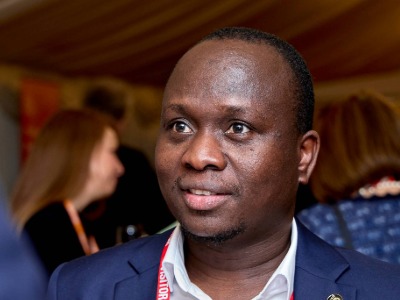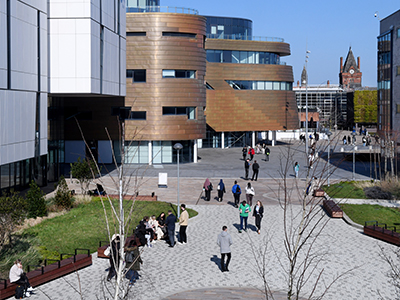Latest news
Teesside University research team wins national Elektra Award for groundbreaking carbon removal innovation
![L-R - Dr Faizan Ahmad (Teesside University) and Professor Ondrej Masek (University of Edinburgh). [Naomi Gabrielle Photography]. L-R - Dr Faizan Ahmad (Teesside University) and Professor Ondrej Masek (University of Edinburgh). [Naomi Gabrielle Photography]. Link to L-R - Dr Faizan Ahmad (Teesside University) and Professor Ondrej Masek (University of Edinburgh). [Naomi Gabrielle Photography].](https://www.tees.ac.uk/images/commonimages/publication_photos/release_photos/main/8938.jpg)
A pioneering Teesside University research project developing an innovative carbon capturing soil conditioner has won a prestigious award.
27 Feb 2026

Teesside University academic shaping climate policy through prestigious fellowship
Lecturer in Environmental Science Dr Oluseye Oludoye has been awarded a prestigious UKRI Policy Fellowship with the Welsh Government to inform national climate and environmental policy.
26 Feb 2026

Teesside Taskforce Journal showcases place-based leadership, green growth and a new national model for renewal
The Teesside Taskforce today (February 26) announces the launch of the first edition of the Teesside Taskforce Journal.
26 Feb 2026

Free research training delivered by Teesside University reaches milestone
A team of academics from Teesside University is about to deliver its 100th free training session, supporting the professional development of local authority staff, healthcare professionals, educators and doctoral students.
25 Feb 2026

Movie visual effects Oscar nomination for Teesside University graduate
Working on a film inspired by a real-life dramatic wildfire rescue mission has earned a best visual effects Oscar nomination for a Teesside University graduate.
18 Feb 2026
Other news
- New report showcases transformative support for students
- National recognition for students involved in community-led alleyway project
- Teesside University to host 10th International Visual Methods Conference (IVMC27) in 2027
- Teesside University helping to unite students and nurses to tackle health inequalities
- Apprenticeships helping career growth across the University
![More about Teesside University research team wins national Elektra
... L-R - Dr Faizan Ahmad (Teesside University) and Professor Ondrej Masek (University of Edinburgh). [Naomi Gabrielle Photography]](https://www.tees.ac.uk/images/commonimages/publication_photos/release_photos/thumbnails/8938.jpg) Teesside University research team wins national Elektra
...
Teesside University research team wins national Elektra
... Teesside University academic shaping climate policy through
...
Teesside University academic shaping climate policy through
... Teesside Taskforce Journal showcases place-based leadership,
...
Teesside Taskforce Journal showcases place-based leadership,
...